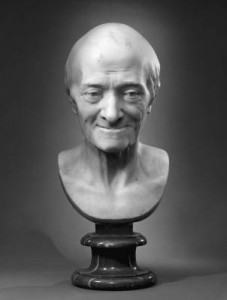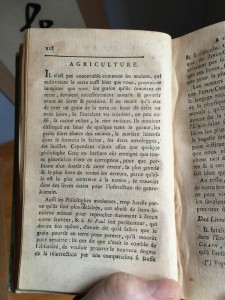“It is inconceivable how the ancients, who cultivated the land as well as we do, could imagine that all the  seeds they sowed on the ground had to die and rot before sprouting and producing. It would only have needed someone to pull a seed from the ground at the end of two or three days; it would have appeared fine, a bit swollen, the root below and the earth above.”
seeds they sowed on the ground had to die and rot before sprouting and producing. It would only have needed someone to pull a seed from the ground at the end of two or three days; it would have appeared fine, a bit swollen, the root below and the earth above.”

Agriculture
“They would have distinguished, at the end of the seed, the little white threads of the roots, the opaque material which composes flour, the two envelopes, the leaves.
Until now that has been enough for some philosophers.
Greeks and barbarians alike would have been extinguished if all life arose from corruption, because nobody doubted it & this error – the largest and most mad of all errors because it is the most contrary to nature, can be found in books written for the education of humanity.”

Here Voltaire is playfully backhanding the theory of spontaneous generation – the idea that certain forms of life arise from death or corruption.
Take that Aristotle!!!

I’m with Voltaire on this one: Aristotle was primarily good at convincing everyone else he was right (rhetoric) and not much else.
For a different perspective, Aristotle’s Lagoon, presented by Armand Leroi. Basically, Aristotle was the first person to actually study animals and their development and life cycles, systematically cataloging and analyzing their similarities and differences.
Leroi does not gloss over the parts where Aristotle went wrong, including pointing out that Aristotle simply failed to conceive of the simplest controlled experiment where a dead fish is placed in a container with cloth over the top: No flies coming in, no flies arising from the “corruption” of the decaying flesh.
The show says that it was actually Aristotle’s friend Theophrastus who studied plants and botany. I don’t know how he could have avoided Voltaire’s simple experiment — but I also don’t actually know what Theophrastus wrote about plant germination.
@Owlmirror#2:
I can enthusiastically recommend that book, too. It was a very interesting and enjoyable read.
I think Voltaire is also somewhat exaggerating and probably didn’t do the experiment himself. Most seeds don’t germinate in a couple of days. Wheat germinates in 5-10 days. Still – his point is good.
It’s funny how the “accepted wisdom” is so often wrong.
The link above is to the documentary, rather than a book. The only book I’ve read by Leroi is “Mutants”, which points out that developmental plasticity means that even people with seemingly wildly different bodies can be surprisingly capable.
Having skimmed the WikiP page on Theophrastus, I note that it states: “Theophrastus detected the process of germination and realized the importance of climate and soil to plants.”
His book on plants looks decidedly thorough. There, it says: “Theophrastus writes that plants can grow spontaneously, from seed, or from vegetative parts of the plant.”
I suspect that, similarly with the fly eggs being laid in decaying flesh, the plants that were alleged to grow by spontaneous generation were probably actually from spores too small to easily see.
The great failure of imagination from the ancients does seem to be the inability to imagine things too small to see. For instance, all the way up into the middle ages, they knew that all plants had to come from seeds. Since no one could find any seeds from ferns, the conclusion was not “fern seeds must be really really small” but rather “fern seeds must be invisible.” Thus, if you could figure out when ferns produced their invisible seeds and put a cloth under one, you might be able to collect the invisible fern seeds — and maybe if you got enough, you could make a potion that would make you invisible too!
brucegee1962@#5:
The great failure of imagination from the ancients does seem to be the inability to imagine things too small to see.
Yes, but Epicurus (and I believe others) had already expounded on a form of atomic theory. Aristotle seemed to be a bit dogmatic about some of his theories.
One of the things that constantly surprises me is how many philosophers, even up to the enlightenment, pretty much accepted anything that was written in a book – whether the book was the bible, or Aristotle.